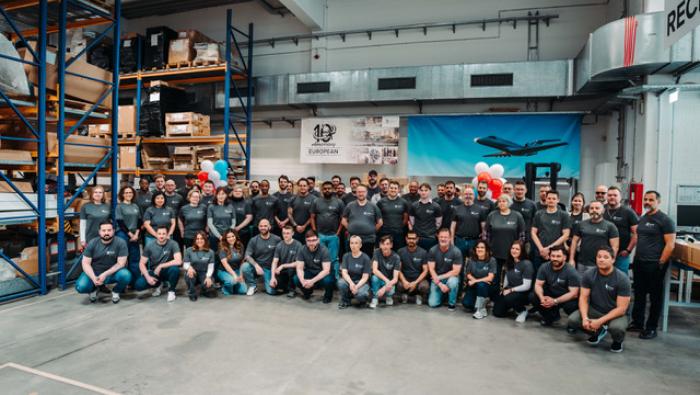Dassault Aircraft Services (DAS) is eying expansion of the services and capabilities offered throughout its network as part of a wholesale review the company is undertaking to enhance customer relations, build on quality and extend capacity.
Dassault brought in turnaround and startup specialist Mark Ozenick earlier this year to lead the service network in North, South and Central America. Ozenick, who was the founding president and CEO of HeliFlite Shares and has been involved in a handful of turnarounds, emphasized, “DAS is not broken.” But Ozenick also said the entire network is undergoing a cultural change.
DAS, the customer service network for Dassault Falcon, has company-owned service centers in Wilmington, Del.; Reno, Nev.; and Little Rock, Ark.; in North America, along with Sorocaba center in South America. They accompany Dassault’s centers in Bordeaux-Merignac and Paris Le Bourget in France, as well as a network of satellite service centers, spares depots, a mobile repair unit (MRU) and authorized service centers.
Ozenick and the Falcon team are working on a multi-pronged initiative to improve the customer experience, responsiveness and customer ownership— making it “better, cheaper, faster,” he said—adding that the hope is to become more competitive than the top-tier independent service companies.
This means an evolving culture to ensure that the focus remains on the customer’s needs and that the customer is heard. In the past this wasn’t consistent across all locations, he said. “We’re selling relationships,” he said, emphasizing that the service business is built on trust.
Improving Service Access
Along with strengthening the customer relationship, DAS is working to provide a more seamless experience so customers can get services at the most convenient center, Ozenick said. DAS technicians from one location may be sent to another, if required, to support a given project, even if the aircraft is not at one of the major centers. To make it easier for the customer, the Dallas-based DAS MRU, which supports aircraft throughout the U.S., is working toward bringing not only unscheduled maintenance but regularly scheduled 1A maintenance to the customer’s aircraft. The company also is targeting reduction of downtime and continuous improvement with a goal of bringing “quality escapes to zero,” he said.
DAS has bolstered spares inventory to $825 million at 15 distribution centers to ensure it has parts coverage throughout the fleet. With "classic" Falcons comprising just over one-third of the fleet, the inventory takes the legacy aircraft into account as well. In fact, earlier this year Dassault added a Falcon Classic session to its maintenance and operations program to ensure those operators are aware of the support options that remain available for them.
Other steps designed to lower cost for Falcon customers are aimed at extending scheduled maintenance intervals. For the Falcon 7X/8X, 1A intervals were stretched to 12 months/800 hours from nine months/600 hours; and 2A went to 24 months/ 1,600 hours from 18 months/1,200 hours. In progress is an effort to extend 4A intervals to 48 months from 36, targeted for next year. Similar extensions are also under way for the Falcon 50, 900 and 2000 series from their either eight- or six-month intervals to multiples of 12-month intervals for 1A-4A maintenance.
One key reorganization was realignment of pre-purchase efforts into a newly named unit, Falcon Pre Purchase Services, led by Gary Schiff, general manager, and Michelle Averso, director.
DAS also has packaged other services efforts such as design engineering and certification engineering. DAS believes its relationship with the parent factory, as well as expansive organization designation authorizations, give it a leg up in providing expertise and equip it to coordinate on STC packages, retrofits and other modifications. The company coordinates with its international counterparts to help expedite approvals. This cuts out the middleman, Ozenick said, noting that “third parties have to go through us.”
The company has introduced a Falcon Systems Solutions team that works directly with Dassault Aviation and Dassault Falcon Jet Technical Working Group to develop certified retrofits and upgrades for Falcon operators, as well as work with major avionics and other OEMs “to define the roadmap of each Falcon” with a goal to ensure each Falcon meets new mandates and is continuously improved. This is particularly important with upcoming ADS-B/Fans deadlines, he noted.
Infrastructure Investment
All of this is taking a substantial investment, Ozenick said. DAS is investing heavily in its staff, with all employees undergoing training every year. The company estimates it spends $2.5 million annually on this training, which amounts to 18,000 hours each year. Along with training, DAS is investing in new equipment and software such as Catia v5 throughout the network.
The company is evaluating expansion and other investment possibilities at facilities throughout the network, and while Ozenick said the company is not yet ready to reveal specifics about those investments, he added, “everything is on the table.”
This evaluation is driven in part by growth in the used market, which is demanding more capacity and capabilities. “The used market is hot,” Ozenick said. “We are changing what we do to get ready for that.” It also is being driven by the overall growth of the fleet, with 2,100 Falcons in service.
A few months ago the company won back its maintenance for the NetJets Falcon 2000 fleet, which has boosted business as facilities such as the U.S. flagship center in Wilmington, as well as at the West Palm Beach, Fla. satellite line service operation located by a NetJets center. Wilmington is close to capacity, and Ozenick indicated that limitation is under study. He also expressed interest in possibilities for the West Palm Beach operation. As for the Brazilian center at Sorocaba, Falcon do Brasil, Ozenick said, “we’ve got some good things in mind” for growth there.
Also outside the U.S., the company is bringing three more operations on line (in Toronto, New Delhi and Ostafievo in Russia); the company is not ready to reveal details.







